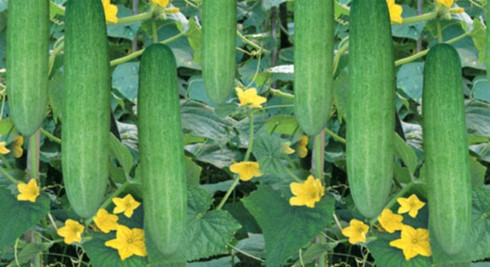Foreign plant varieties overwhelm domestic varieties?
The increase in plant variety imports is partly due to limited investment by businesses in the field of plant variety selection and production.
According to statistics from the General Department of Customs, in 2016 Vietnam imported nearly 150 thousand tons of plant seeds, including more than 7,000 tons of rice seeds, the rest were grass, corn, vegetable, flower and watermelon seeds... In the first 3 months of this year, Vietnam also imported more than 4,800 tons of various plant seeds, including nearly 220 tons of rice seeds, mainly from China.
 |
| The quality of domestic plant varieties is increasingly dependent on imported sources. (Illustration: KT) |
Recently, Ho Chi Minh City has strongly developed the orchid and ornamental plant growing industry. Therefore, in 2016 alone, local producers imported about 1.5 million orchid seedlings of all kinds to serve the city market as well as neighboring provinces.
Mr. Bui Van My, Director of the Ho Chi Minh City Agricultural Consulting and Support Center, said that currently, seed companies and research centers still cannot meet domestic market demand.
“Although new orchid varieties can still be crossbred in Vietnam, the quality of the flowers is not good, and the number of flowers on a branch is small. Some other varieties have not yet met consumer tastes, while producers rely on consumer demand to constantly change, so the demand for imported varieties is still increasing,” said Mr. My.
Faced with the situation that plant variety producers and traders in Vietnam still have to depend on imported varieties, many experts believe that, to reduce dependence on imported varieties, Vietnam must gradually improve the quality of seed selection and breeding and invest more money and human resources in seed selection and breeding. This is not only the work of the State but must be socialized and attract private enterprises to do it together.
Dr. Le Qui Kha, Deputy Director of the Southern Institute of Agricultural Science and Technology, said that the productivity of some crop varieties such as corn and rice in the Chinese and American markets, and vegetable varieties in the Taiwanese (Chinese) market are quite good, so our country often imports them.
Not only our country, many countries in the world also have to import plant varieties. However, this import will lead to monopoly and dependence on imported varieties. While Vietnam has research topics on plant varieties every year, the scientific research staff is lacking.
“In recent years, many multinational companies have paid high salaries to attract skilled Vietnamese technical staff. This has led to the situation where leading staff and leading staff in research on seed production in Vietnam are no longer strong,” said Dr. Le Qui Kha.
Currently, Vietnam is fully qualified to produce quality plant varieties. The important thing is to focus on human resources and appropriate organizational methods. Vietnam's seed experts are not lacking and have produced many good varieties.
Specifically, among more than 100 rice varieties in the Mekong Delta region today, at least 4 varieties can produce rice that sells for 600 - 800 USD/ton... However, the key problem is that even though there are good varieties, the management, production and mechanization stages are not done well, making the agricultural products less competitive.
Mr. Nguyen Hong Son, Director of the Department of Crop Production, Ministry of Agriculture and Rural Development, said that encouraging organizations and individuals to invest heavily in research and creating good plant varieties, especially outstanding fruit varieties, is an issue that deserves attention.
“The crucial weakness of Vietnamese fruit varieties is that the quality of the varieties is still low, so in the coming time this issue will be included in the management work. The Department is strengthening the supervision of copyright to manage the original varieties and parent varieties provided by the authors themselves,” said Mr. Son.
Experts say that Vietnam currently has only a few native breeds, but some countries with advanced technology have imported them, improved them, and put them into commercial use. Many rare genetic resources in Vietnam are gradually disappearing, because funding for breeding in Vietnam is limited, while abroad there are abundant scientific and technological resources.
Therefore, the issue of copyright protection and brand name of seed sources is very important. However, if the current situation continues, Vietnam will lose all rare genetic resources. Therefore, it is necessary for businesses to participate in investing in the field of selecting and producing plant varieties, especially science and technology businesses./.
According to VOV
| RELATED NEWS |
|---|

